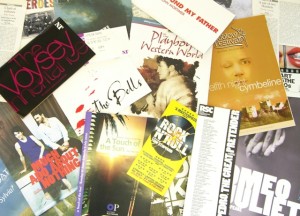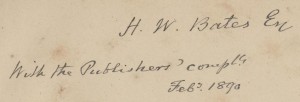In Special Collections, we’re not just custodians of dusty books and archives which have been in the University’s possession for decades. In fact, the biggest part of our collections are the Theatre Collections, and we constantly try to update and renew all of the collections in our care. The latest addition to our constantly evolving holdings is the Foulkes Collection, programmes donated to Special Collections by drama historian Professor Richard Foulkes.
Professor Foulkes is an Emeritus Professor at the University of Leicester, where he is also a member of the Centre for Victorian Studies. His specialisms are Shakespearean and 19th and 20th Century theatre. He has also been involved in the ‘Victoria and Albert, Art and Love‘ project, which ran a major exhibition at Buckingham Palace during 2010. Professor Foulkes is chairman for the Society for Theatre Research and has donated programmes dating from the 1960s up to 2008.
The Foulkes Collection provides an excellent companion to our existing theatre collections, particularly the Reading Rayner Collection. Jack Reading, who donated the Reading Rayner Collection to the University, was a founder member, chairman and then vice president of the Society for Theatre Research. The majority of Professor Foulkes’ programmes focus on provincial theatre, particularly in the midlands, while also containing material from London and America. Donated in two batches between 2009 and 2010, work has now begun on cataloguing all of these programmes.
Because the majority of our programmes cover the period from the 1940s to the 1980s extensively, but provide less coverage of more recent decades, the decision has been taken to catalogue the materials in reverse chronological order. If you have a look at the search feature on the website, you will see that Professor Foulkes’ programmes for 2008 have already been catalogued. We’re working on a webpage about the collection to stand alongside information about other collections which you can find on the site.
Another major advantage of this collection is that some of the programmes contain cuttings and reviews of the productions. Considering how frequently we are asked for reviews of specific productions, I’m sure that this will be extrememly useful to all of our researchers. If the programme includes reviews, this will be noted on the catalogue record.
It’s still a work in progress, of course, and the complete cataloguing of the collection will take a considerable time, but I will be uploading records to our website for each year as it is completed. I hope that you will find these new resources useful for your research and we would like to thank Professor Foulkes for his donation to our evolving theatre archive.
If you would like any more information on any of the materials in our collections, or if you would like to book an appointment to view specific items, please email us to ask.



